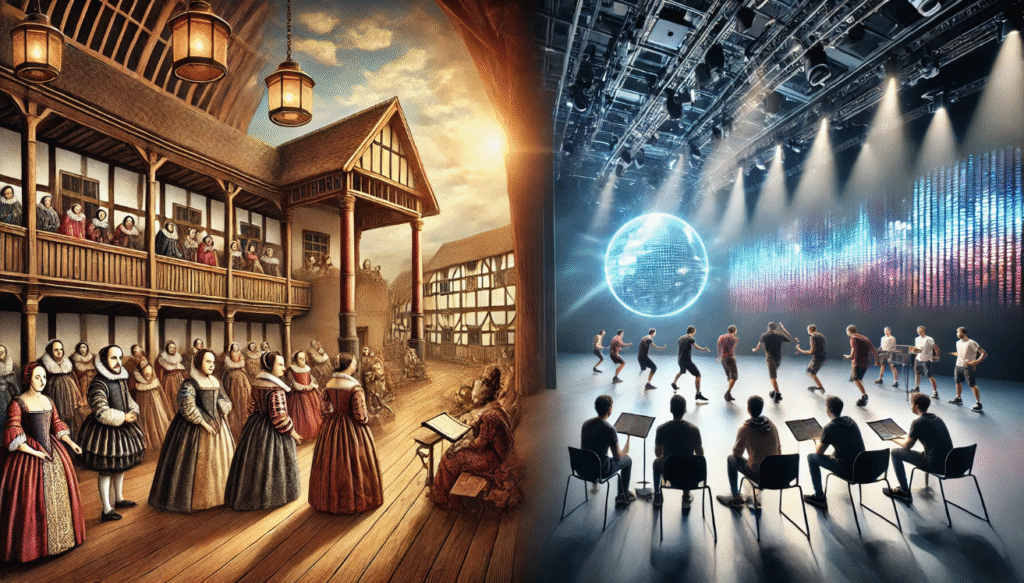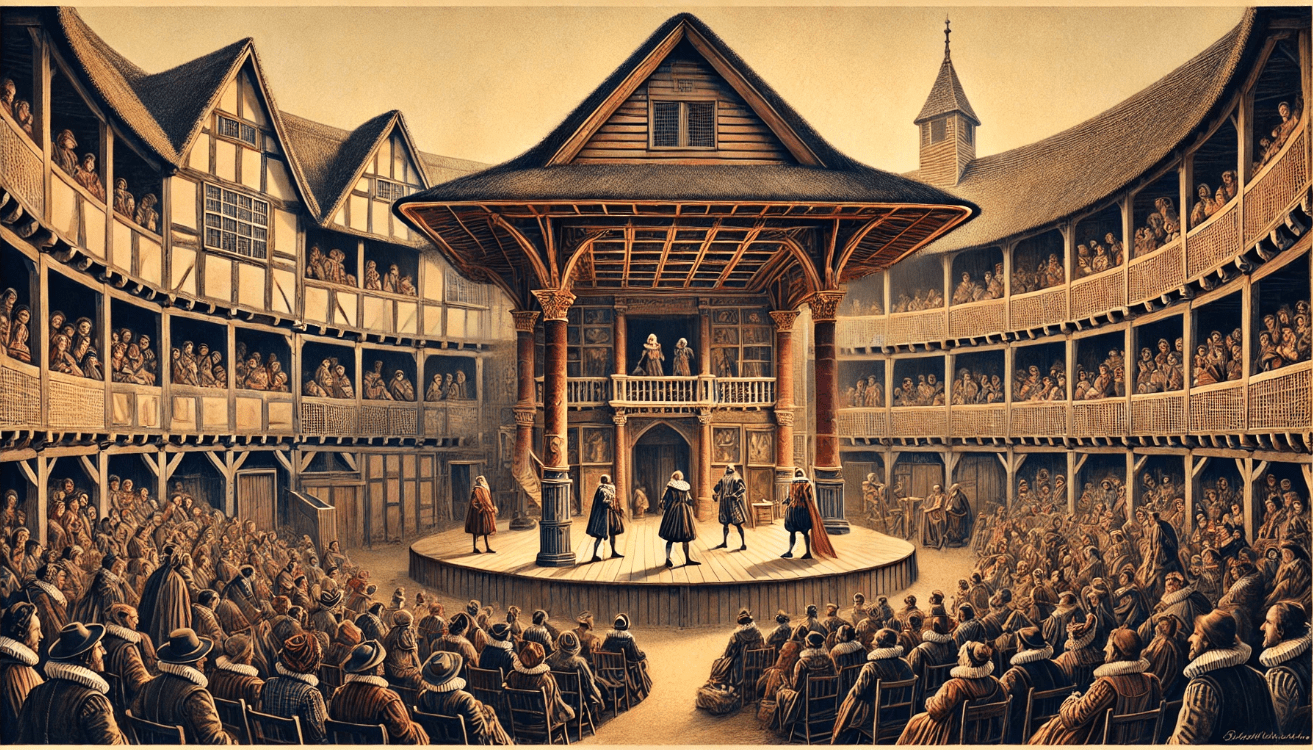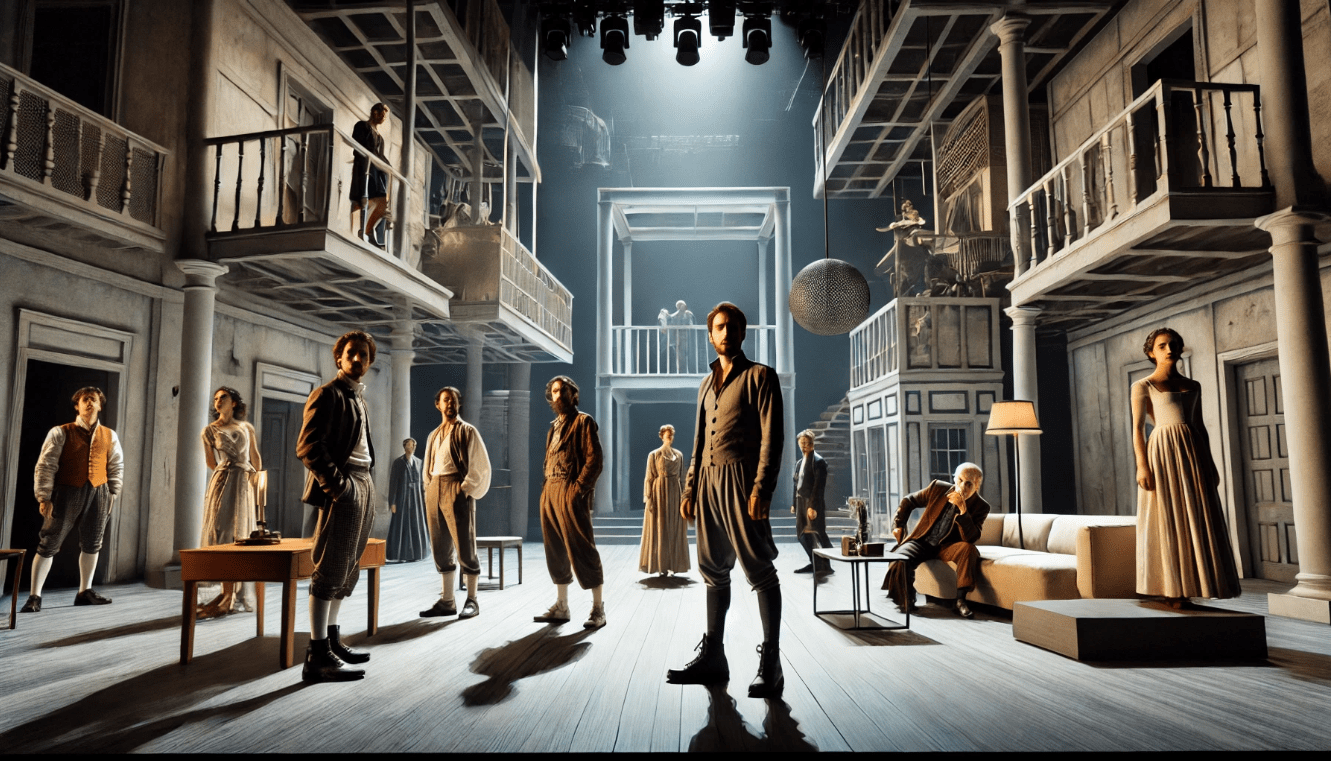
Shakespeare’s Role in the Professionalization of Theatre: How His Legacy Shaped Modern Performance
When we think of theatre today, we often envision polished performances, professional actors, and grand productions. But it wasn’t always this way. Before William Shakespeare, theatre was a far more chaotic and amateurish endeavor, often relying on travelling troupes and community-based performances. So, how did we get from those humble beginnings to the highly professionalized industry we know today? The answer lies in Shakespeare’s role in the professionalization of theatre.
Shakespeare didn’t just write iconic plays—he revolutionized the entire theatre landscape. His work transformed actors from hobbyists into professionals and gave rise to permanent theatre companies that could deliver consistently high-quality performances. This shift paved the way for the modern theatre industry we enjoy now, and understanding his impact is essential for anyone in the world of performance arts.
In this article, we’ll explore how Shakespeare’s legacy shaped modern theatre, from creating structured companies to inspiring new acting techniques. By the end, you’ll see how his contributions continue to influence today’s stage, and you’ll walk away with actionable insights for making your own professional theatre experience even stronger. Keep reading to discover how this literary giant still shapes the art of performance! 🎬
Table of Contents
Toggle1: Shakespeare’s Theatre: From Amateur to Professional 🎭
Before Shakespeare, theatre in England was often a patchwork of amateur performances, usually by local troupes or community groups. These productions were largely informal, with actors often unpaid or only compensated for their travel expenses. Most plays were one-off events or tied to religious festivals, making it difficult for actors and playwrights to earn a stable living.

The Transition to Professional Theatre
Shakespeare’s arrival on the scene changed everything. He was not just a playwright; he became a central figure in the establishment of a professional theatre industry. One of his most significant contributions was the creation of permanent theatre spaces like The Globe Theatre in London. These venues allowed for regular, organized performances that could generate steady income, unlike the fleeting shows of the past.
At The Globe and other venues, actors no longer had to rely on temporary contracts. Instead, they became part of established theatre companies, like Shakespeare’s own company, the Lord Chamberlain’s Men (later known as the King’s Men). These companies provided actors with long-term, stable employment, turning acting into a viable career. 📜
A Shift in the Business Model
Before Shakespeare’s time, the financial structure of theatre was inconsistent. But Shakespeare helped introduce a more sustainable business model for the industry. Theatre companies were now able to sell tickets to regular performances, which meant more financial stability. Actors were often paid a salary or could share in the company’s profits, giving them a sense of ownership and a reason to invest in their craft.
Shakespeare also pushed for professionalization behind the scenes. In addition to actors, the roles of directors, stagehands, and designers became more organized and specialized. This created a more cohesive approach to putting on a show, allowing for higher-quality productions that appealed to a broader audience. 🎬
Shakespeare’s Influence on Repertoire
Another key change Shakespeare brought was the development of a consistent repertoire. He didn’t just write one-off plays; he created a wide range of works, from tragedies and comedies to histories. This diversity allowed theatre companies to perform year-round, keeping audiences engaged with fresh material. It also gave companies a reliable pool of work to draw from, establishing theatre as a professional industry that could support a variety of talents—actors, playwrights, directors, and technicians.
2: The Impact of Shakespeare on Theatre Companies 🎭

Shakespeare didn’t just write plays—he helped create a new model for theatre companies that set the foundation for professional theatre as we know it today. His influence on how companies were structured and operated is a key part of his legacy, and it’s still relevant for anyone involved in the theatre industry today.
The Birth of the “Professional” Theatre Company
Before Shakespeare, most actors worked with temporary troupes that performed sporadically. Theatre was a more casual, hit-or-miss business. But Shakespeare’s involvement with companies like the Lord Chamberlain’s Men (later known as the King’s Men) changed this dynamic. These companies weren’t just ad-hoc groups; they were permanent, professional organizations. For the first time, actors and playwrights had a stable platform for their work.
Shakespeare was more than just a playwright—he was also a shareholder in the Lord Chamberlain’s Men, which gave him a vested interest in the success of the company. This ownership model helped ensure that the company was financially stable and focused on providing consistent, high-quality performances. 🎭
A New Business Model for Theatre
By being part of a professional company, actors no longer had to rely on traveling performances or one-time gigs. Instead, they were part of a collective that worked together to create a steady stream of shows. This model wasn’t just beneficial for actors; it also allowed other important roles in theatre to emerge and be properly compensated. Directors, producers, and designers could now be full-time professionals rather than temporary contributors.
Moreover, the company system helped establish a financial structure that was sustainable. Profits from ticket sales, sponsorships, and royal patronage were distributed among the members of the company, including the actors, playwrights, and back-office staff. This was a far cry from the more unstable financial arrangements of earlier theatre troupes.
The Role of Patronage and Partnerships
Shakespeare’s relationship with royal and noble patrons was also instrumental in shaping how theatre companies operated. By securing the support of Queen Elizabeth I and later King James I, Shakespeare’s company enjoyed financial stability and prestige. Patronage was crucial to the early survival and success of professional theatre companies.
This relationship with powerful patrons allowed theatre companies to focus on producing more plays and growing their audiences. The presence of these patrons also helped elevate the status of theatre from a lowly art form to a respected industry. 🌟
The Legacy of Shakespearean Theatre Companies
The model that Shakespeare helped establish—professional companies with full-time actors and stable financial backing—continues to be the standard in modern theatre. Today’s major theatre companies around the world, whether producing Shakespeare’s works or contemporary plays, rely on this same business structure.
For modern theatre practitioners, understanding how companies evolved through Shakespeare’s time is crucial for building successful, sustainable theatre projects. Whether you’re starting your own theatre company or working as an actor or director, stability and consistency are key to achieving long-term success.
3: Shakespeare’s Influence on the Artistic Side of Theatre 🎭

Shakespeare didn’t just change how theatre companies were structured; he also transformed the very artistic practices of theatre. His influence on playwriting, acting, and performance style continues to shape modern theatre today. Let’s explore how his creative contributions raised the standards of artistic expression and elevated theatre into a respected art form.
Revolutionizing Playwriting: Complex Characters and Deep Themes
Before Shakespeare, many plays were straightforward and focused more on spectacle than substance. Shakespeare, however, introduced a new depth to storytelling by creating complex characters and weaving intricate, multi-layered plots. His characters were not just heroes or villains—they were deeply human, grappling with internal conflicts, moral dilemmas, and emotional struggles. This made his plays not only entertaining but thought-provoking.
For modern playwrights, Shakespeare’s style offers valuable lessons in character development. The depth and complexity of his characters, from Hamlet’s philosophical musings to Lady Macbeth’s ambitious drive, set the stage for today’s multi-dimensional characters in theatre, film, and television. His influence on dramatic structure, with its blending of tragedy, comedy, and history, also continues to inspire new works.
Shakespeare’s Impact on Acting: From Traditional to Psychological
Shakespeare didn’t just write complex characters—he also transformed how those characters were performed. In his plays, actors were required to portray a range of emotions, from the deepest despair to the most joyful ecstasy. This psychological depth was a game-changer for acting, pushing performers to dig deeper into their craft.
The use of soliloquies—those iconic moments where characters speak their innermost thoughts aloud—was one of Shakespeare’s signature techniques. These monologues allowed actors to showcase their emotional range and connect more intimately with the audience.
In today’s theatre, the legacy of emotional authenticity and psychological realism continues in the acting world. Shakespeare set the standard for actors to fully inhabit their characters, creating performances that are not just believable but deeply moving. 🎭
Shakespeare’s Influence on Performance Styles: Stagecraft and Presentation
Beyond writing and acting, Shakespeare’s works helped elevate stagecraft and the overall presentation of theatre. During Shakespeare’s time, the stage at places like The Globe Theatre was relatively simple, but the storytelling was rich with symbolism, props, and dynamic staging. Actors had to convey complex themes with minimal resources, which made them more creative in their use of language, movement, and costumes.
This emphasis on symbolism and imaginative presentation influenced modern performance styles. Today’s theatre often uses minimalistic sets and creative staging techniques to convey powerful narratives, just as Shakespeare did with his limited resources. Directors and designers continue to draw on his innovative use of space, lighting, and costumes to create engaging visual experiences.
Shakespeare’s Lasting Legacy in Modern Theatre

Shakespeare’s artistic influence doesn’t stop at the stage. His works continue to be at the core of modern theatre training. Acting schools and drama programs around the world still require students to master Shakespearean texts, as understanding his work is seen as a fundamental part of becoming a skilled actor or director. Shakespeare’s emphasis on language, emotion, and physicality forms the backbone of contemporary training methods.
4: The Influence of Shakespeare on Modern Theatre 🎭
Shakespeare’s impact on theatre didn’t stop with his own era. His legacy continues to shape the way we approach performance, storytelling, and even business models in the theatre world today. Whether you’re an actor, director, playwright, or theatre enthusiast, understanding how Shakespeare’s influence extends to modern theatre practices is essential for appreciating the craft.
Shakespeare’s Enduring Role in Theatre Education 🎓
One of the most significant ways Shakespeare continues to influence modern theatre is through education. His works remain a cornerstone of theatre training programs worldwide. Students and professionals alike are taught to analyze his complex characters, innovative use of language, and emotional depth.
For actors, mastering Shakespeare’s language and verse is considered a rite of passage. His plays challenge performers to hone their skills in voice control, emotional expression, and physicality. Directors and theatre professionals also study Shakespeare’s innovative staging and character development, as his works are seen as the gold standard for dramatic storytelling.
Whether in prestigious conservatories or community theatre workshops, Shakespeare’s influence shapes curricula and provides actors with tools that help them build strong, versatile careers. 🎭
Global Impact: Shakespeare Across Borders 🌍
Shakespeare’s works are not just confined to English-speaking audiences; they’ve gone global. His plays have been translated into almost every language, and productions are regularly staged in different cultural contexts. From Japanese Noh theatre to Indian adaptations, Shakespeare’s themes—like love, power, betrayal, and ambition—resonate universally.
Modern theatre companies continue to explore innovative ways to reinterpret Shakespeare’s works. Directors are constantly adapting his plays to reflect contemporary issues, social movements, and diverse cultures. This global adaptability keeps Shakespeare’s work relevant across borders and generations, allowing it to thrive in the ever-changing world of theatre.
Shakespeare’s Influence on Modern Performance Styles 🎬
In modern theatre, Shakespeare’s style of blending comedy and tragedy, realism and poetry, is still seen as a benchmark for creative storytelling. Directors today frequently blend traditional approaches with modern elements, such as contemporary settings, cutting-edge technology, and diverse casting, to make Shakespeare’s works more accessible and relevant to today’s audiences.
One of the hallmarks of Shakespeare’s theatre was its fluidity—the ability to move between different genres and emotional tones. Modern plays, films, and performances continue to draw on this technique, using unexpected shifts in mood, character development, and plot structure to keep audiences on the edge of their seats.
Shakespeare and the Rise of Professional Theatre Companies 🌟
Shakespeare’s role in the development of permanent, professional theatre companies still influences how we think about theatre companies today. His model of stable, well-funded companies, like the King’s Men, laid the groundwork for today’s professional theatres that can support long-term productions and develop ongoing relationships with actors, directors, and playwrights.
This model has been crucial in building successful theatre industries around the world. Theatre companies no longer need to rely on ad-hoc performances or one-off events; they can plan seasonal repertoires, develop new works, and attract a loyal audience base.
Shakespeare’s Lasting Impact on Theatre Accessibility 🎟️
Shakespeare’s theatre legacy also paved the way for increased accessibility in the arts. With the creation of permanent venues and the rise of professional acting, theatre became a public experience, no longer just a courtly or private affair. This democratization of theatre helped transform it into a major cultural force that continues to attract diverse audiences across the world.
Many modern theatres embrace this accessibility by offering affordable tickets, staging performances in varied venues, and making productions available through digital platforms. Shakespeare’s model of bringing theatre to the public is alive and well in these efforts, allowing everyone to experience the magic of the stage.
5: Practical Takeaways for Theatre Professionals 🎭

Shakespeare’s role in the professionalization of theatre offers countless lessons for modern theatre professionals. Whether you’re an actor, director, playwright, or theatre producer, there are several practical insights from Shakespeare’s legacy that can help you succeed in today’s competitive theatre world.
1. Build a Strong, Committed Company 👥
One of Shakespeare’s greatest contributions was the establishment of permanent theatre companies. These companies provided actors and creatives with long-term security, turning theatre into a viable career.
Takeaway for Today: Consider building or joining a professional theatre company where everyone—actors, directors, designers, and technicians—shares a commitment to the craft and the company’s vision. A stable, cohesive team is essential for consistently delivering high-quality productions and attracting loyal audiences.
2. Invest in Consistent Repertoire and Programming 🎟️
Shakespeare’s plays were performed regularly by his company, creating a consistent repertoire that audiences could expect. This approach made theatre more predictable, creating opportunities for financial stability and artistic growth.
Takeaway for Today: Whether you are managing a theatre company or directing a show, consider offering a consistent schedule of performances. Developing a repertoire that mixes classic works (including Shakespeare’s plays) with new, innovative productions keeps your company relevant and can attract a wider audience.
3. Master the Art of Storytelling and Character Development 📖
Shakespeare revolutionized character development by creating multi-dimensional characters with deep emotional struggles. His plays explore universal themes, allowing audiences to connect across time and culture.
Takeaway for Today: As a playwright or director, focus on creating compelling, complex characters. Don’t just rely on simple narratives; instead, challenge your actors and audiences with characters who are morally ambiguous and psychologically rich. This will make your productions stand out and resonate deeply with your audience.
4. Embrace Innovative Staging and Performance Techniques 🎬
Shakespeare’s minimalistic yet creative staging at The Globe Theatre demonstrated that you don’t need an elaborate set to create a powerful performance. He focused on symbolism, language, and actor interaction to convey meaning.
Takeaway for Today: Think outside the box when it comes to stage design and performance techniques. Explore how you can use lighting, props, and movement to convey the essence of the story, even in smaller, more intimate settings. Creativity in staging can elevate any production, no matter the budget.
5. Leverage Shakespeare’s Model for Financial Sustainability 💸
Shakespeare’s theatre companies were financially stable due to their patronage, ticket sales, and revenue from regular performances. His model created an environment where artists could thrive without constantly worrying about funding.
Takeaway for Today: Theatre companies today should consider diversifying revenue streams. This could mean securing sponsors, offering memberships, and streaming performances online to reach a global audience. Financial sustainability gives your company the freedom to focus on artistic quality rather than just survival.
6. Adapt Shakespeare’s Work to Modern Audiences 🌍
Shakespeare’s plays have been reimagined in countless ways—from modern-day adaptations to cross-cultural reinterpretations. His work’s universal themes—love, power, betrayal—resonate with audiences across different contexts.
Takeaway for Today: Don’t be afraid to adapt Shakespeare’s work (or other classic plays) to fit modern themes and diverse audiences. Whether it’s updating the setting, casting a diverse range of actors, or using contemporary music and language, there’s a wealth of opportunity in keeping Shakespeare’s legacy alive through innovative adaptations.
7. Prioritize Accessibility and Inclusivity 🎟️
Shakespeare’s theatre was accessible to a wide range of people, with inexpensive tickets for standing room and performances that appealed to both the elite and the general public.
Takeaway for Today: Ensure your productions are accessible by offering affordable tickets, hosting community events, and exploring digital streaming options to make theatre available to a broader audience. Inclusivity should be at the heart of your artistic practice—everyone should feel welcome in your theatre.
The Enduring Legacy of Shakespeare in Theatre 🌟
Shakespeare’s role in the professionalization of theatre transformed not just the way plays were written and performed, but also the very structure of the theatre industry itself. His impact can still be felt today, from stable, professional theatre companies to innovative approaches in acting, writing, and production. His legacy laid the groundwork for the global theatre scene we know today, and his influence continues to shape the art of storytelling, performance, and business in the theatre world.
For modern theatre professionals, there’s a wealth of knowledge and inspiration in Shakespeare’s work. From building a committed company to experimenting with innovative staging and adapting his works for contemporary audiences, his approach to theatre offers timeless lessons. By focusing on artistic depth, financial sustainability, and inclusive accessibility, you can create impactful, lasting theatre that resonates with today’s diverse audiences.
As we continue to navigate the ever-changing landscape of modern theatre, Shakespeare’s lessons remind us that great theatre isn’t just about entertainment—it’s about creating a shared experience that speaks to the heart of the human condition.
So, whether you’re an aspiring actor, a seasoned director, or someone looking to make your mark in the theatre world, remember: Shakespeare didn’t just change the theatre—he professionalized it, and in doing so, he set the stage for the vibrant, dynamic art form we continue to cherish today. 🌍🎭
Frequently Asked Questions (FAQs)
1. How did Shakespeare help professionalize theatre?
Shakespeare played a crucial role in the professionalization of theatre by helping establish permanent theatre companies, such as the Lord Chamberlain’s Men, and creating a more stable financial model for theatre. His involvement in these companies provided actors with steady employment and elevated theatre from a casual pastime to a respected, professional industry.
2. What impact did Shakespeare have on modern theatre companies?
Shakespeare’s work helped establish the model of professional theatre companies where actors and other creatives were paid for their long-term involvement. This structure encouraged consistent performances, professional training, and more organized theatre productions, shaping how modern companies operate today.
3. How did Shakespeare influence acting in modern theatre?
Shakespeare’s plays encouraged actors to portray characters with psychological depth and emotional complexity, moving beyond traditional, one-dimensional roles. This focus on realism and emotional authenticity in acting continues to be a cornerstone of modern performance techniques, especially in method acting.
4. Why is Shakespeare’s work still important in theatre education?
Shakespeare’s works are essential in theatre education because they offer rich language, complex characters, and innovative storytelling techniques. Mastering his plays helps actors develop their skills in voice control, emotional range, and dramatic timing, making his plays a staple in acting curriculums worldwide.
5. How did Shakespeare impact the business side of theatre?
Shakespeare helped shift theatre from a hobby or community activity to a commercial enterprise by introducing practices like ticket sales, royal patronage, and financial backing for permanent companies. His business model enabled the theatre industry to thrive and become financially sustainable
6. What is the significance of Shakespeare’s global influence on theatre?
Shakespeare’s works have been translated into every major language and adapted to fit various cultural contexts, allowing his plays to resonate with audiences around the world. His universal themes of love, power, and betrayal continue to inspire global theatre productions, making him a truly international figure.
7. How did Shakespeare’s approach to writing plays change theatre?
Shakespeare’s innovative writing techniques, such as creating complex characters and intertwining multiple plots, elevated the craft of playwriting. His use of soliloquies and emotional depth set new standards for storytelling in theatre and still influence contemporary playwrights today.
8. What lessons can modern theatre professionals learn from Shakespeare?
Modern theatre professionals can learn from Shakespeare’s focus on professional collaboration, financial sustainability, and artistic depth. By building strong, committed theatre companies, creating consistent repertoires, and adapting classic works for modern audiences, today’s professionals can continue to grow and thrive in the theatre industry.
